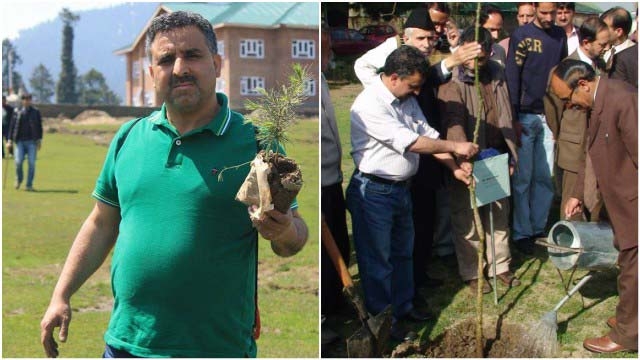From saving damaged trees to planting 1.2 lakh new ones, Abdul Hamid is certainly doing his bit to make Kashmir greener.
When 52-year-old Abdul Hamid started tying ropes around wilted and broken trees, particularly on the airport road, to resurrect them, it hardly attracted any attention in the strife-torn Kashmir valley. “Somebody planted the trees, but nobody took care of them. Some of them were broken, some were uprooted and others were wilting away. So I tied and watered them regularly for three years”, says Hamid.
It was nothing short of a prayer and the beginning of a silent revolution to salvage the fragile environment. From saving damaged trees in 2006 to launching a movement to plant more saplings in 2009, Hamid has come a long way and is now referred to as the ‘Tree Man’ of Paradise.
The prominent Kashmiri businessman, who is the chairman of Rahim Group of Companies has planted 1.2 lakh trees spanning the length and breadth of Kashmir, from Sutaharan’s denuded forest ranges to Srinagar’s serene campuses, in the last eight years. Initially, 10,000 to 15,000 trees were planted every year in schools, colleges, universities, forests and other open spaces.
In 2009, Hamid decided to put aside a specific amount of his profit to plant trees. “I used to buy trees from the government at Rs2 per tree. Later they hiked the rate to Rs14 per tree. The increase did not break my resolve. Every year I keep aside around Rs4 lakh for this purpose,” says Hamid.
A class IX dropout, Hamid started a roadside scooter workshop to eke out his living in Srinagar. In 1995, he sold his family land and started Rahim Motors. Since then there’s been no looking back. Today his company has an annual turnover of Rs25 to 30 crores and provides employment to 200 people. But protecting the environment has remained his first love and the reason he started Rahim Greens, a non-profit organization to help save the environment. “It’s not an NGO. Funding for this project comes from the profits of my companies and my own pocket. We do not accept donations”, he adds.
What has added a new dimension to his work was afforestation in the smuggling prone areas of the valley. “There were certain areas where trees were mercilessly felled and smuggled. I started going to these areas, planting trees and involving people. Today, people are taking care of these trees as they realise the adverse impact of deforestation”, he says.
Hamid’s social work transcends beyond the environment. He flew to Chennai to distribute medicines when the floods hit, and volunteered to help people the people of Thailand, during the 2011 flood. In recognition of his work, he was recently awarded Bartos Fellow at UWC-United States of America. “My work has just begun”, he says.
Courtesy: DNA

